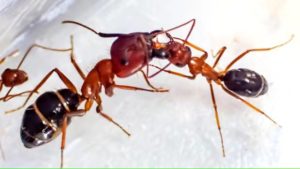Ants are incredibly social insects, forming complex colonies that demonstrate a range of cooperative behaviors. One of the most intriguing strategies they employ to combat pathogens, particularly fungal infections, is known as “social immunization.” This process reflects the remarkable adaptability of ants and their communal approach to enhancing colony health. Social immunization involves the intentional spreading of infections among colony members, ultimately leading to the development of collective immunity.
Understanding Social Immunization
Social immunization can be described as a behavioral mechanism through which infected ants help protect their colony from disease. Rather than isolating infected individuals, ants will actively engage with them, spreading the fungus while simultaneously enhancing the immune defenses of the colony. This seemingly counterintuitive behavior is a striking example of how social organisms can use cooperation to manage disease dynamics.
The Mechanics of Social Immunization
1. Infection and Detection:
– When an ant becomes infected, it may carry fungal spores on its body or within its gut. Ants have a keen ability to detect chemical signals associated with pathogens, allowing them to identify infected individuals.
– Upon encountering a sick ant, other workers exhibit a tendency to lick the infected individual. This behavior may seem risky, but it serves a dual purpose.
2. Inoculation and Exposure:
– As healthy ants lick an infected member, they come into contact with the fungal spores. This exposure is crucial as it helps the ants’ immune systems learn how to respond to the specific pathogen.
– Just like vaccination in humans, this practice familiarizes the colony members with the pathogen, enabling them to develop adaptive immune responses.
3. Fungal Spore Reduction:
– The action of licking is not merely a means of spreading infection. Ants’ saliva contains antimicrobial properties that can help kill some of the fungal spores. Regular grooming and licking can thus reduce the overall fungal load on individuals, contributing to colony health.
Evidence of Social Immunization
Research has provided compelling evidence for social immunization among various ant species:
– Ants and Pathogen Resistance:
Studies have shown that when healthy ants are exposed to fungal pathogens via infected ants, they often demonstrate enhanced immunological resistance. This adaptive response is not limited to just the individual ant but extends throughout the colony.
– Fungus and Worker Behavior:
Experiments have indicated that ant species, such as the leafcutter ant, exhibit increased grooming behavior toward infected peers. These actions reduce the overall infection load and promote an environment conducive to developing resilience against pathogens.
Implications for Colony Survival
1. Collective Defense:
The practice of social immunization ultimately benefits the colony as a whole. By spreading pathogens within the colony, ants develop a collective immune response, leading to increased overall survival rates.
2. Epidemiological Consequences:
Social immunization alters the dynamics of disease transmission within ant colonies. It creates a feedback loop whereby the exposure enhances resistance to the pathogen, reducing the likelihood of widespread outbreaks.
3. Evolutionary Adaptation:
This behavior can be viewed as an evolutionary adaptation, allowing ant species to maintain high-density populations while minimizing the risks associated with diseases that could decimate the colony.
The Broader Picture: Lessons for Human Health
The concept of social immunization in ants offers valuable insights for understanding disease management in human populations. The cooperative behavior seen in ant colonies highlights the potential benefits of community-based health initiatives:
– Vaccination Strategies: The principles of social immunization can inform vaccination strategies for infectious diseases by promoting herd immunity through community engagement and collective exposure.
– Antimicrobial Resistance: Studying how ants manage pathogens may provide novel approaches to combating antimicrobial resistance. Understanding natural defenses can inspire new treatments or preventive strategies in medicine.
Social immunization exemplifies the complex and sophisticated modes of interaction within ant societies. Through their cooperative behaviors, ants demonstrate an unparalleled approach to disease management that enhances the resilience of their colonies. This fascinating interplay between individual behavior and collective health underscores the importance of social dynamics in both nature and potential human health applications. Ants serve as a model for understanding how cooperation and communal strategies can be effective tools in combating disease, revealing fundamental principles that link social behavior to survival and health across species.

 Pazionmedia.com Pazion Media l Latest News l Politics l Sports l Entertainment
Pazionmedia.com Pazion Media l Latest News l Politics l Sports l Entertainment



